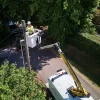Virgin Media Complains to EU Over State Aid for BT Broadband Rollout
Cable operator Virgin Media (Liberty Global) has called on the European Commission to help stop any future allocations of state aid going towards BTOpenreach’s “fibre broadband” network expansion, which they fear would create an “unacceptable risk of overbuild of existing networks.”
The Government’s related Broadband Delivery UK programme has so far committed around £1.6bn of public funding towards the expansion of fixed line superfast broadband (24Mbps+) services to cover 95% of the United Kingdom by 2017/18, which exists largely because the private sector was reluctant to push faster services beyond around the 70% mark.
Advertisement
Related areas in the final 30% can suffer due to lower population densities and more costly deployments (e.g. tackling Exchange Only Lines), which makes it difficult to gain a viable return on any investment. Meanwhile Virgin Media’s own network currently covers around 45% of the UK and is being expanded to around 60-65% by 2020, albeit predominantly focused upon urban areas (i.e. the easy to reach low hanging fruit) and they’re not open to use as a wholesale platform.
It’s of course no secret that Virgin Media has never been entirely happy with the public subsidies that BT (Openreach) gets paid in order to expand the coverage of their Fibre-to-the-Cabinet (FTTC) dominated network (example), which centres around a fear that BT may ultimately be able to use the funding to overbuild parts of their own network.
Brief Summary of Virgin Media’s Key Points
* The clawback (gain share) mechanism in related BDUK contracts, which will be applicable for a 7 year period, requires BT to return part of the investment when take-up of the new service passes beyond the 20% mark (currently worth up to £129m across the United Kingdom). The money is intended to be reinvested in improved coverage, although Virgin claims that it could also result in excess revenues of £320m-£869m for BT over a 20-year period that could in turn be used to overbuild.
* Virgin doesn’t want more public funding to tackle the final 5-10% and would instead prefer to see such investment being focused on raising demand or delivering Satellite. Virgin believes that demand will then result in alternative network providers delivering for the final 5-10% as they would thus find it to be more commercially attractive.
As the CEO of Virgin Media, Tom Mockridge, told the FT, “The BDUK scheme does not offer the taxpayer value for money. It is no longer necessary in today’s investment-rich market and it leads to wasteful overbuild. Strong, competing networks are the answer; there is no longer a need for taxpayer-funded broadband rollout.”
Certainly the Government has until very recently been quite weak on its support for alternative network providers, which in fairness may be partly fuelled by the costly failure of projects like the Digital Region scheme in South Yorkshire (here) and not to mention Fibre GarDen’s recent troubles in Cumbria (here).
Advertisement
On the other hand there have been plenty of seemingly good examples too, such as via B4RN, Gigaclear, Hyperoptic and a number of fixed wireless projects etc. Indeed it would be good to see the more successful altnet providers, such as those that were able to get off the ground without recourse to state aid, being given more support. Some signs of this were present in last week’s proposal for a new Broadband Investment Fund (here), but the details remain wafer thin.
At this point it should be noted that councils often have the final say in how state aid is allocated and many of them are naturally risk averse, choosing BT for the financial security and certainty of delivery. BT might not always be the only game in town or even the best option for some areas, but concerns about austerity cuts and public image (loss of votes) often override other considerations. BT itself also disagrees with Virgin’s interpretation.
A BT Spokesperson said:
“Virgin appears to have little grasp of how the project works as BT cannot make excess returns under the contracts and the seven-year period for gainshare is set under EU aid law. It is also the case that any higher returns are not split on a 50/50 basis. In fact, the majority of those funds will be returned to the public sector to improve coverage even further.”
The BT spokesperson further pointed out that Virgin Media has so far shown little interest in helping to tackle rural areas and indeed the cable operator’s arguments might carry more weight if they themselves were willing to help such locations, but they’re not (running the occasional rural trial doesn’t really count).
Instead Virgin is happy for rural areas to have Satellite and the hope that maybe.. possibly.. someday an altnet might invest in new infrastructure. But hope alone does not make for a good plan and Satellite is far from perfect (here).
Advertisement
As it stands the current BDUK scheme does appear to be largely compliant with EU state aid rules, as checked by the European Commission, and we’re still waiting to see precisely what model the Government will adopt to help reach the final 5% of homes and businesses. But that doesn’t mean to say it’s perfect.
Indeed there are some areas where Virgin Media’s complaint may have more merit, such as in regards to the recently awarded £1.9m contract to cover parts of North Swindon with a superfast wireless broadband network (here). Crucially the new network may also bleed into a number of urban areas where Virgin Media would like to expand or already exists, which is one of the challenges with deploying wide-coverage wireless solutions (perhaps a postcode block for orders from overbuilt areas?).
At the end of the day Virgin Media’s position in the market, existing as it does via a closed commercial model that tends to only focus on dense urban locations, means their complaint probably won’t get very far. On the other hand they do make some valid points about the need to support altnets and the use of state aid in more urban locations, where the threat of overbuilding carries more weight.
Meanwhile the Government believes that BDUK “represents value for money for the taxpayer” and states that it has also been assessed by the EC, National Audit Office (here) and others to be compliant with the rules.
Mark is a professional technology writer, IT consultant and computer engineer from Dorset (England), he also founded ISPreview in 1999 and enjoys analysing the latest telecoms and broadband developments. Find me on X (Twitter), Mastodon, Facebook, BlueSky, Threads.net and Linkedin.
« IFNL Says All New UK Homes Need a Pure Fibre Optic Broadband Service

















































Comments are closed